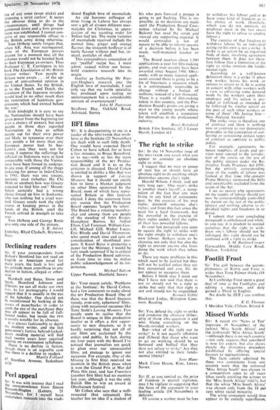BFI films
Sir: It is disappointing to me as a reader of the SPECTATOR that prob- lems at the Institute (21 November) are dealt with in such little depth. One would have expected David Cohen to have talked. for at least a few minutes. to Bruce Beresford, or to me—with us lies the main responsibility of the BFI Produc- tion Board and it is to us the criticism is directed. David Cohen is entitled to dislike a film that was shown in support of Loving Memory but it should not entitle him to form a blanket judgment on other films sponsored by the Board, most of which have repre- sented Britain at film festivals abroad. I deny the statement from any source that the Production Board operates 'largely by whim'. The Board has a rotating member- ship and among them are people of the standing of Wm Berger. Humphrey Burton, Sir Arthur Elton, Carl Foreman. William Gas- kill. Michael Gill, Walter Lucas. Eric Rhode and David Thompson, who spend much time and care on consideration of shortlisted pro- jects. If Karel Reisz is preparing a paper for the Minister. I would be very much surprised if he is critical of the Production Board activities. as horn time to time he makes public acknowledgement of its im- portance.
Michael Balcon Upper Parrock, Hartfield, Sussex
Sir: Your recent article. Problems at the Institute', by David Cohen, had a few comments to make about the BFI Production Board. One of these was that the Board finances 'trendy, over-arty, ephemeral' films, along with occasional successes like Tony Scott's Loving Memory. Few people seem to realise that the Board is unique in film production insofar as it offers a first oppor- tunity to new directors, so it is hardly surprising that not all of our films are acclaimed by the critics and public. In fact, during my four years with the Board I've noticed that journalists are quick to gloat over our unsuccessful films, yet manage to ignore our successes. For example, One of the Missing (a first film) received no mention in the British press when it won the Grand Prix at Mar del Plata this year, and San Francisco (another first film) had no mention last year, although it was the only British film to win an award at Oberhausen festival.
Mr Cohen also says that a well- respected (but unnamed) film teacher has no idea if a student of his who puts forward a project is going to get backing. This is im- possible, as no decisions are made until the Production Board Com- mittee (chaired by Sir Michael Deleon) has read the script and viewed any supporting material. It would contradict a law of nature to be able to inform anyone of a decision before it has been made, well-respected teacher or not.
The Board receives about 1.500 applications a year for film-making grants. and over seventy have been awarded since August -1966. Obvi- ously, a ith so many rejected appli- cants around there is going to be a lot of bitterness. a situation which it is unfortunately impossible to change without a budget of millions, instead of a few thousand. There is a wealth of film-making talent in this country. and the Pro- duction Board's grants are giving a start to the young people whose talent will establish a reputation for themselves in the professional industry.
Bruce Beres ford British Film Institute, 42/3 Lower Marsh, London SE i














































 Previous page
Previous page